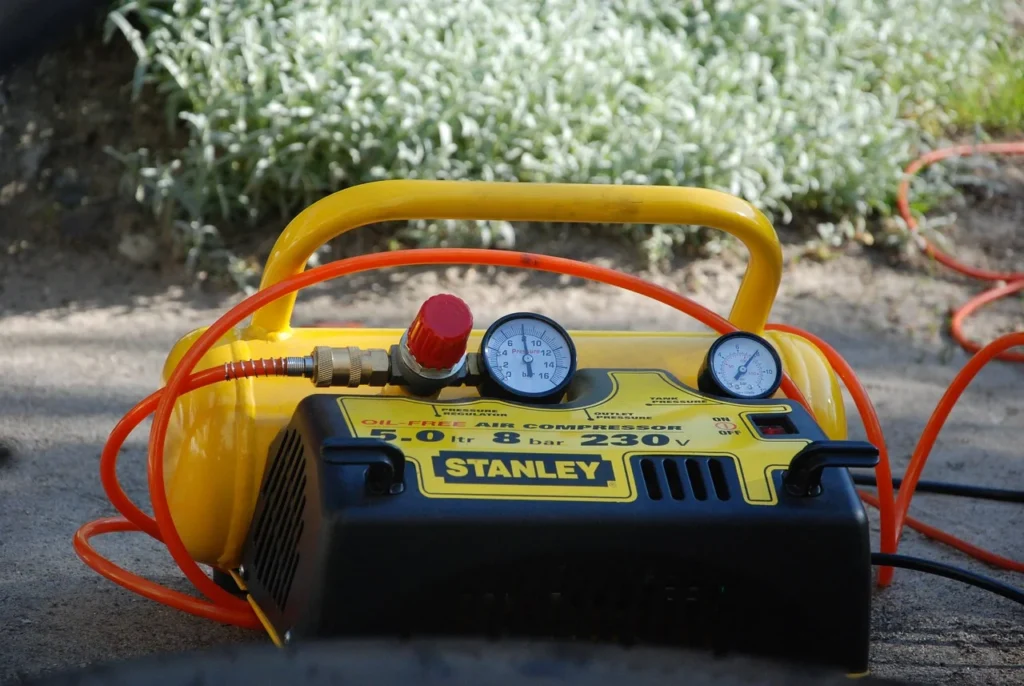Air compressors are essential tools in various applications, from running pneumatic equipment to inflating tires. But, how long does an air compressor last? Well, with proper care and maintenance, an air compressor can serve you diligently from 5 to 20 years. However, factors such as usage frequency, quality of parts, and operating conditions can influence this lifespan. This blog will discuss these factors, explore the lifespan of different compressor types, and offer tips on extending your compressor’s life.
Average Air Compressor Lifespan
Air compressors are known for their durability. With regular maintenance and care, they can last between 5 to 20 years, depending on the type and usage. However, this is not a fixed lifespan. While some compressors may last well beyond two decades, others may wear out after a few years. It all boils down to how well you care for your compressor.

Air Compressor Lifespan Factors
The lifespan of an air compressor is influenced by several factors. Let’s explore them:
Usage Frequency: The more often you use your air compressor, the shorter its lifespan. Frequent use leads to wear and tear of the components, reducing the compressor’s life.
Operating Environment: The environment in which you operate your compressor also matters. Dusty or dirty environments can clog the compressor, reducing its efficiency and lifespan.
Quality of Parts: High-quality parts last longer. Therefore, investing in a compressor with top-tier components can extend its life.
Proper Sizing: The size of your compressor should match its intended use. Overworking a small compressor can lead to premature failure.
Maintenance: Regular maintenance is crucial. Clean and lubricate the compressor regularly to keep it running efficiently and extend its life.
Operating Conditions: Extreme heat, cold, or humidity can impact the compressor’s performance and lifespan. It’s best to operate the compressor in a controlled environment.
Average Lifespan by Compressor Type
Understanding the lifespan of an air compressor begins with understanding the different types of compressors available. Different compressors have different lifespans, and understanding this can help you make an informed purchase decision.
Reciprocating Air Compressors
Reciprocating air compressors, commonly used in homes, garages, and small shops, are known for their durability. Their average lifespan stands at around six years or 50,000 hours of operation. However, with proper maintenance, this lifespan can be extended up to 10-15 years, ensuring you get the most out of your investment.
Rotary Screw Compressors
When we talk about commercial and industrial applications, rotary screw compressors are the go-to choice. Their robust build and innovative design allow them to have an average lifespan of 10-15 years or over 100,000 hours. What’s more, with diligent maintenance, these compressors can last up to 20 years or more.
Centrifugal Air Compressors
Centrifugal air compressors are popular in manufacturing facilities and gas pipelines due to their high efficiency and reliability. Typically, these compressors have an impressive lifespan of 20-30 years or 250,000+ hours. However, don’t be surprised if a well-maintained centrifugal air compressor outlasts this average lifespan, operating reliably for 40 years or even longer. Proper care and maintenance play a crucial role in extending the life expectancy of these robust machines.
Steps To Extend Air Compressor Life Expectancy
To maximize the lifespan of your air compressor, careful attention must be paid to its maintenance. Regularly checking the air filter can prevent dust and debris from wearing down your compressor’s components. Draining moisture after every use is another important step, as it prevents internal corrosion. Consistent oil changes ensure smooth operation, while inspecting belts and hoses allows for early detection of potential failures.
Further, clean exterior surfaces can prevent overheating, while safety valves need regular checks to ensure they function correctly in case of overpressure. Lastly, pay attention to any unusual noises as they often indicate an underlying issue that needs immediate attention. By following these steps, you can significantly extend the life expectancy of your air compressor.
When To Replace Air Compressor?
Knowing when to replace your air compressor can save you from costly repairs and downtime. Common signs that your compressor needs replacing include frequent breakdowns, an inability to hold air pressure, and persistent leaking. Additionally, if your compressor is reaching the end of its average lifespan and is constantly malfunctioning, it may be more economical to replace it rather than invest in repeated repairs.
Conclusion
The lifespan of an air compressor is largely dependent on how well and regularly it is maintained. While different types of compressors have varying lifespans, proper care and maintenance can significantly extend this. By understanding the factors that affect the lifespan of your air compressor and following the recommended maintenance procedures, you can ensure that your air compressor serves you for many years. After all, an air compressor is an investment, and like all investments, it should be well taken care of to yield the best returns.